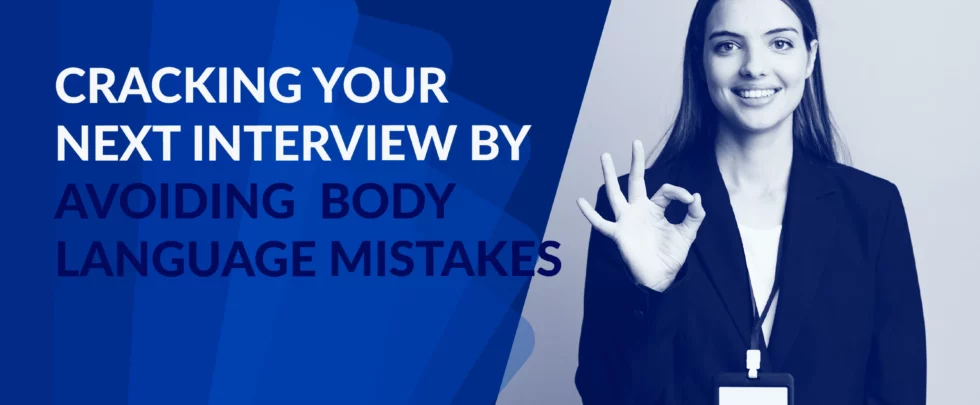Everyone says that body language is everything, but really, what does that even mean? You probably already know that you need to sit straight and smile, but what else? What lies behind these surface-level tips everyone repeats the second they hear you have an upcoming interview?
If these questions happen to roam around your head and you were wondering what any of them mean, then you have come to the right place!
Body language is a crucial part of communication, especially during interviews. It can often speak louder than words, conveying confidence, nervousness, or even dishonesty. Unfortunately, many people make common body language mistakes during interviews without even realizing it.
These mistakes can negatively impact their chances of landing the job they want. In this article, we’ll explore some of the most common body language mistakes and provide tips on how to avoid them, so you can ace your next interview with confidence!
Shall we get into it?
Why is Your Body Language Important?
Body language is a crucial aspect of communication during a job interview. It can be just as important as the words you say, as it can convey a lot of information about your personality and level of confidence.
Your body language can tell the interviewer whether you are confident, nervous, interested, or disengaged. That’s why it’s crucial to be aware of your body language and make a conscious effort to avoid common mistakes that could harm your chances of landing the job.
Your body language says a lot about you and can speak volumes even before you say a word. For example, slouching or fidgeting can make you appear nervous or disinterested while maintaining eye contact, and sitting up straight can show that you are confident and engaged.
Similarly, a weak handshake can make you appear unconfident or timid, while a firm, but not aggressive, handshake can show that you are confident and assertive. It’s essential to understand the message you are sending through your body language to make sure you are making a positive impression during your interview.
By paying attention to your body language, you can present yourself as the best candidate for the job and increase your chances of getting hired!
But what are the dos and don’ts of body language? The next section will tell you all about it and explain it in more detail!
Tips to Avoid Body Language Mistakes in an Interview
When it comes to job interviews, it’s not just about what you say but how you say it. Body language plays a crucial role in how interviewers perceive you, with research showing that it accounts for 55% of how others see us. This means that even if you have all the skills and experience required for the job, your nonverbal communication could still be holding you back.
So, shall we get into it?
Sit Up Straight
Let’s start with the basics here, why don’t we?
When it comes to job interviews, it’s not just about what you say but how you say it. Body language plays a crucial role in how interviewers perceive you, with research showing that it accounts for 55% of how others see us.
To explain it better, this basically means that even if you have all the skills and experience required for the job, your nonverbal communication could still be holding you back.
In addition to its effects on your interviewer, sitting up straight can also help you feel more confident and composed. When you’re nervous, it’s easy to let your shoulders slump and your back hunch forward. This posture can make you feel smaller and more vulnerable, exacerbating your anxiety.
By sitting up straight, you expand your chest and open up your body, which can help you feel more powerful and in control. So not only does good posture look good, but it can also help you feel good and perform your best during the interview!
Don’t Forget to Smile
Smiling is another key component of nonverbal communication, and it can have a significant impact on your job interview. A warm, genuine smile can instantly make the interviewer feel at ease and create a positive impression. It can also show that you are friendly, approachable, and confident.
However, be careful not to force a smile too much, or it may come off as insincere. Instead, try to relax and let a natural smile form on your face.
It is definitely what you need to do in order to make a great first impression, smiling during an interview can help you establish rapport with your interviewer. It can create a sense of connection and mutual understanding, making the conversation more comfortable and enjoyable for both parties.
Moreover, a smile can also make you feel more relaxed and reduce any nerves or anxiety you may be feeling. So, before you walk into the interview room, take a deep breath, put on a smile, and show your interviewer that you are ready to shine!
Your Handshake Matters
Your handshake can speak volumes about your personality and attitude, so it’s important to get it right during a job interview. A limp or weak handshake can give the impression that you lack confidence or enthusiasm, while a bone-crushing grip can make you seem aggressive or domineering. Ideally, you want to aim for a firm and friendly handshake that conveys professionalism and respect.
When you meet your interviewer, make sure you extend your hand with a confident grip and a warm smile. Make eye contact while shaking hands and be sure to maintain a comfortable amount of pressure throughout the handshake. Don’t be afraid to initiate the handshake if your interviewer doesn’t, as this can show your eagerness and assertiveness.
If you’re prone to sweaty palms, it is nothing to be too worried about, just take a moment to dry them before shaking hands. You can do this discreetly by wiping them on a tissue or your pants before the interview begins. Remember, your handshake is often the first physical interaction you’ll have with your interviewer, so make it count by projecting confidence and professionalism.
Practice Your Facial Expressions
Practicing your facial expressions can help you project the visage you want and avoid sending the wrong message during a job interview. It can be easy to unintentionally convey disinterest, boredom, or even contempt with your facial expressions, so it’s important to be aware of how you’re coming across to your interviewer.
One way to practice your facial expressions is to stand in front of a mirror and go through the various emotions you might feel during an interview, such as concern, thoughtfulness, and excitement. See if your expressions are coming across as you intend or if they could be misinterpreted. For example, a furrowed brow might be interpreted as anger or frustration, while a slight smile might convey friendliness and openness.
Another way to practice your facial expressions is to have a friend or family member watch you as you respond to common interview questions. Ask them for feedback on how your facial expressions are coming across and if they’re sending the message you want to convey.
Practicing your facial expressions can help you present yourself in the best light possible during an interview. It can help you avoid sending mixed signals or unintentionally conveying a negative impression. So, take some time to practice your facial expressions and make sure they’re projecting the image you want to convey.
Keep The Eye Contact
Eye contact to put it simply conveys confidence, trustworthiness, and respect. It also helps you connect with your interviewer on a personal level, which is essential for building rapport.
On the other hand, avoiding eye contact can convey disinterest, dishonesty, or lack of confidence. It can also make the interviewer feel uncomfortable and lead to an awkward conversation. So, it’s important to maintain appropriate eye contact throughout the interview.
It’s also essential to strike a balance. You don’t want to stare too intensely and make your interviewer uncomfortable, but you also don’t want to look away too often and appear disengaged. A good tip is to take small breaks to look away, jot down notes, or consider the interviewer’s points, and then regain eye contact!
The goal is to be engaged and interactive without making the interviewer feel uncomfortable!
What Not to Do When It Comes to Body Language
We now know what it takes to present yourself well through your body language, let us discover what you should know to avoid pulling everything together, we prepared a couple of things for you to keep in mind!
Wandering Eyes
It’s important to make a positive impression and show that you’re engaged and interested in the opportunity. That’s why it’s best to keep your focus on the interviewer and avoid letting your eyes wander around the room or stare off into space. Not only can this make you seem uninterested, but it can also be distracting and come across as disrespectful!
Remember, the interview is a chance for you to showcase your skills and qualifications and demonstrate why you’re the best fit for the job. By maintaining good eye contact and actively listening to the interviewer, you’ll not only show your enthusiasm and engagement, but you’ll also be better able to respond to their questions and tailor your responses to their needs.
So, when you’re in that interview room, take a deep breath, relax, and focus on the task at hand. With a little bit of confidence and some good eye contact, you’ll be sure to make a great impression and increase your chances of landing the job!
Fidgeting Around
While it’s normal to feel a little nervous, it’s important to try to stay calm and collected. One thing that can be distracting for the interviewer is fidgeting.
Fidgeting can take many forms, from tapping your foot to playing with your hair or jewelry. While it might seem harmless, it can give the impression that you’re not fully focused or that you’re not taking the interview seriously. Instead, try to sit still and maintain good posture. This can help you come across as confident and self-assured.
Remember, the interviewer is looking for someone who is professional and capable, so it’s important to present yourself in a positive light. By avoiding fidgeting, you’ll be able to keep your focus on the conversation and show that you’re the right person for the job!
Shrugging
Shrugging may seem like a harmless gesture, but it can actually convey a lack of confidence or disinterest in the job you are interviewing for. When you shrug, you are essentially saying, “I don’t know” or “I don’t care,” which is not the message you want to send to a potential employer. Instead, you want to show that you are enthusiastic and knowledgeable about the position and the company.
Not only can shrugging give off a negative impression, but it can also distract the interviewer from what you are saying. When you are fidgeting or making excessive gestures, the interviewer may focus on your movements rather than your words. If your desire is to make a positive impression and keep the interviewer engaged, it’s important to keep your body language in check!
Remember, a job interview is not just about what you say, but also about how you present yourself. By avoiding shrugging and maintaining confident body language, you can demonstrate your professionalism and show that you are a strong candidate for the job.
Bottom Line
To conclude for you, we know that job interviews can be nerve-wracking experiences, but by being aware of your body language, you can ensure that you present yourself in the best possible light. Remember to maintain eye contact, sit up straight, and avoid fidgeting or shrugging during the interview.
These small adjustments can make a big difference in how you are perceived by the interviewer and can increase your chances of landing the job.
Go into your next interview with confidence and use these tips to put your best foot forward.
Good luck!


